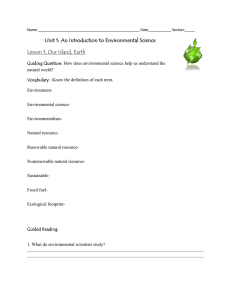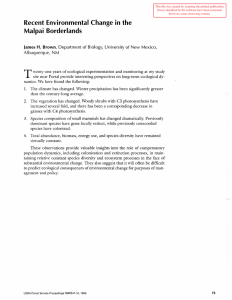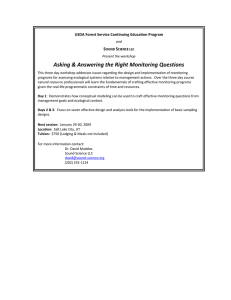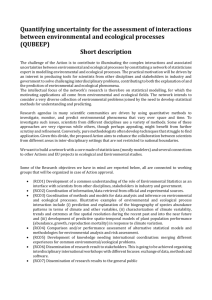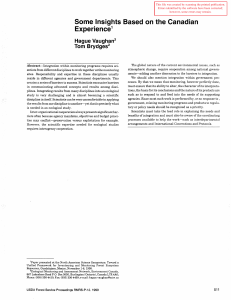To Keep it ‘Zip’ped or Not? Challenges for a
advertisement
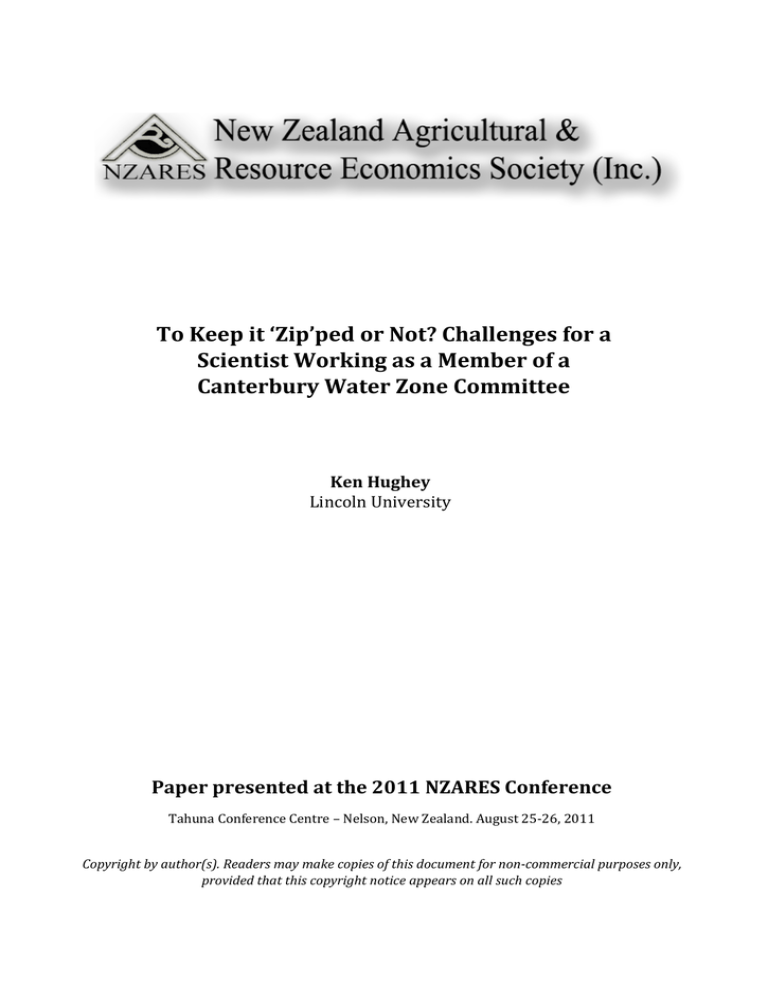
To Keep it ‘Zip’ped or Not? Challenges for a Scientist Working as a Member of a Canterbury Water Zone Committee Ken Hughey Lincoln University Paper presented at the 2011 NZARES Conference Tahuna Conference Centre – Nelson, New Zealand. August 25-26, 2011 Copyright by author(s). Readers may make copies of this document for non-commercial purposes only, provided that this copyright notice appears on all such copies To keep it ‘zip’ped or not? – challenges for a scientist working as a member of a Canterbury water zone committee Ken Hughey Lincoln University Paper to NZARES, Nelson, 25-26 August 2011 Outline • Where I fit in the ‘jig-saw puzzle’ that is Canterbury Water • The appointment process – or ‘how to make friends and influence people’ Democracy or …? • Local vs vocal – an issue of ‘fit for purpose’ • Decision making informed (or not, by science) – some of the big questions • Guiding principles for a scientist in contributing, collaboratively, to integrated planning • Strategies for improving science relevance, and use • Some conclusions and other insights Where I fit in the ‘jig-saw puzzle’ that is Canterbury Water Environment Canterbury (Temporary Commissioners) Act 2010 Canterbury Water Management Strategy: Principles and Targets District Councils ECan Mayoral Forum Regional Policy Statement Regional plans Policy & plan implementation CWMS Regional Committee - RIP CWMS Zone committees x 10 - ZIPs ZIP implementation, including via ASM District plans Policy & plan implementation The appointment process – or ‘how to make friends and influence people’ Democracy or …? • Environment Canterbury and Hurunui DC called for ‘self’-nominations for the community appointee positions on the ZC – early 2010 • After being approached by an ENGO I applied, was not short-listed, then advised I was not selected • I was overseas for a couple of weeks and upon my return was asked if ‘I would like my application reconsidered’ – interesting • I then gave a presentation of my vision for the Hurunui-Waiau zone to a selection panel and was then ‘observed’ participating in a collaborative process • Finally, I was contacted with the great news that I had been selected. Indeed the Christchurch Press gave me the sort of headline I had always sought (but never received as a rugby player) - The Press, 30 June 2010: “Hughey gets water job after selection backflip” Local vs vocal – an issue of ‘fit for purpose’ • One issue two of us (seen, at least initially, as the ‘greenie’ appointees) have faced ‘continually’ is that we live way outside of the zone. When meetings for over a year are every 3 weeks, roughly 3-9pm plus at least an hour of travel each way, then it’s a big commitment for ‘out-of-zoners’. • We frequently get the ‘local problem, local solution’ argument. Our argument – there are matters of local, regional and national interest in the zone and we need to take account of all levels. • And, how vocal (as a non-local) should we be with our input? I would have to say I have varied my input, and had to in order to survive, and in order to have greatest effect. Sometimes, I have been openly angry especially when it comes to matters of policy and science … Decision making informed (or not, by science) – some of the big questions • Land use and water quality – is there a connection and can it be defined? • Environmental flows – can they be defined? • Ecological effects of dams and changed flows – do we know these with confidence? • Are there cost-effective options for non-point source pollution management? Guiding ‘principles’ for a scientist in contributing, collaboratively, to integrated planning • I decided to use some guiding ‘principles’ for informing my inputs into the ZIP preparation process – based on Hughey and Hickling (2006) – and to ‘fight’ until I felt each was properly considered. • These guiding ‘principles’ are built around: – Ecological principles – Objectives and outcomes – Adaptive management – Quality of science information used Operationalising the ‘principles’ Ecological principles Objectives and outcomes Explicit Environmental Objectives Outcomes references impacts are are assessed to ecological attributable to prioritised in terms of processes water resource based on measured and development the likely ecological principles and/or land use ecological responses intensification benefits are clearly that will established accrue from within an the planned ecological management context Adaptive management There is a commitment to ongoing monitoring, using proven methods The policy is flexible enough to allow for periodic reviews of science and management, with the results incorporated into revised management Quality of science information used The best available information is used in designing policy and implementing management – where possible this is scientifically based and peer reviewed Where there is inadequate information to address key information requirements for planning and implementing management, the relevant agencies should commit themselves to appropriate research investment Each of these can be scored on a 1-5 performance criteria scale with 1=very poor and 5=very good Best available range of ecological scientists assisted throughout policy/ planning process Example application to ‘3’ key sections of the ZIP Component of the ZIP 3. Ecosystem health/ biodiversity and braided river character 6 and 7. Waiau and Hurunui river flows 11. Water quality Ecological principles Explicit Environmental references to impacts ecological attributable to processes and water resource principles development and/or land use intensification are clearly established within an ecological context Objectives and outcomes Objectives are Outcomes are prioritised based assessed in on the likely terms of ecological measured benefits that will ecological accrue from the responses planned management Key principles around river flow needs identified, e.g., variability; other ecosystem management principles also given Score: 4/5 Yes – life supporting needs, flow variability, minimum flows Generally yes, especially in relation to the impacts of dams and raising of lakes Yes, and generally (although not always, e.g., restoration priorities) against clear criteria Very clear set of desired outcomes defined – provide sound basis for future management Yes – seeks to establish baseline conditions, but silent on methods Yes – links to Regional Plan with built in review processes Yes, although some information clearly inadequate Calls for collection of more, relevant, and useable information Generally yes – made use of NIWA and ECan scientists, and others as necessary. Score: 4/5 Yes – explicit re impacts of dams on rivers and on Lake Sumner; and effects of lowered flows on river habitat, food supplies Score: 5/5 Mostly, effects clearly articulated, e.g., N & P and algae, but some still poorly understood Score: 3/5 Score: 3/5 Realistic objectives adjusted according to benefits and relationships to other management options Score: 5/5 Yes, although some uncertainties – these are made explicit Score: 5/5 Where possible this has been done, but probably a lack of information on likely responses in some areas Score: 3/5 Yes, clear links to outcomes by controlling pollutants, where known Score: 4/5 Yes – seeks to establish baseline conditions, but silent on methods Score: 5/5 Yes – links to Regional Plan with built in review processes Score: 5/5 Uses NIWA 2-D and related modelling; complemented by expert opinion Score: 5/5 Yes – commitment to gathering baseline information to measure changes against Score: 5/5 Yes – NIWA, DoC, ECan, university, augmented by other experts as appropriate Score: 4/5 Yes, at all scales from whole of river to farm Score: 5/5 Yes, an explicit reference to adaptive management Score: 5/5 Refers to all relevant published information and put into appropriate context Score: 4/5 Identifies need to gather further information, especially at river mouths Score: 5/5 Uses NIWA and ECan scientists Score: 4/5 Score: 4/5 Score: 5/5 Score: 5/5 Score: 5/5 Score: 5/5 Score: 5/5 Score: 5/5 Yes, cause and effects identified with emphasis on N&P relationships, where known Score: 3.5/5 Adaptive management There is a The policy is commitment flexible enough to ongoing to allow for monitoring, periodic reviews using proven of science and methods management, with the results incorporated into revised management Quality of science information used The best available Where there is Best available information is inadequate range of used in designing information to address ecological policy and key information scientists implementing requirements for assisted management – planning and throughout where possible implementing policy/ this is management, the planning scientifically relevant agencies process based and peer should commit reviewed themselves to appropriate research investment Score (/45) 41/45 41/45 39.5/ 45 Strategies for improving science relevance, and it use • Ensure issues with a science connection are identified early • Gather and provide the best available information, including interpretation where possible • Where the science is contested set up a presentation and discussion forum • Develop a credible process to peer review ‘grey’, especially consultant, literature • Use guiding principles to encourage inclusion of science in policy • Involve the committee in the generation of science needs Some conclusions and other insights • More scientists should contribute their expertise to collaborative and ‘wicked’ environmental problem resolution processes. • In these circumstances scientists will face major challenges – to their credibility, to their patience, and to the other work they are trying to complete. • But, knowing that their input will be carefully scrutinised scientists should be guided by a set of principles, aside from that of behaving responsibly – these guiding principles should be constructed around those that scientists would typically use in their day-to-day research and management interactions. • Even after all of this there other more subtle strategies that scientists can use, ultimately knowing that ‘every word counts’, to get outcomes and outputs that are science informed. • So is it worth it? YES!
